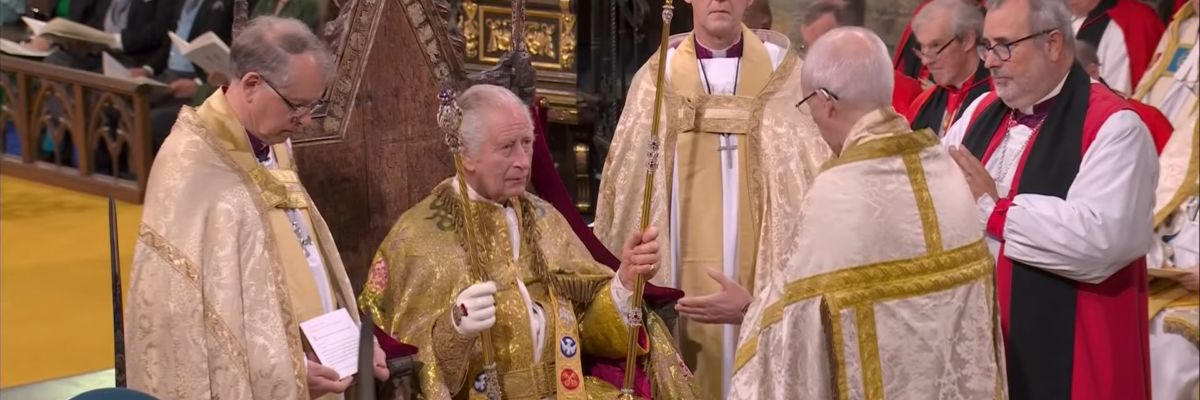
If you are a Catholic outside the U.K., it is likely that you marked the recent solemn anointing, coronation, and enthronement of Charles III as king of the United Kingdom of Great Britain and Northern Ireland with no particular interest beyond the usual one in the day’s news. But if you are a Catholic of a traditionalist bent anywhere—hardly a thing in itself to be despised—you may have found some, but happily not all, commentary by individuals or groups within the traditionalist region of current social media that sought with vehemence to turn you against this coronation and this king. They think that a sensus Catholicus requires this. They think wrongly, and the right view is quite the contrary.
Basically, these hostile arguments amount to two slightly different but compatible takes on the monarchy of Great Britain.
The first says the Church of England, of which the king is by law “supreme governor” (but not spiritual head), is a heretical church without valid orders and which formerly persecuted Catholics, and so the officially Protestant use of the medieval Catholic coronation rite is a mere pretense, and indeed a mockery. Catholics can have nothing to do with such a thing since Christ does not recognize the rule of heretic monarchs.
The second says that the coronation rite was a scandal of religious indifferentism because Catholic prelates and peers participated along with other religious groups in common worship.
Well, rather than take the route of a possibly useless and unnecessarily tedious doctrinal and moral refutation of these misleading and specious arguments, which mistake vehemence with paying attention to the realities before them in plain view, I will make use of the show-stopping logical and legal axiom: Contra factum non fit argumentum: “Against a fact there is no argument.” By fact is meant something that has really happened, an evident, undeniable reality.
Imagine that instead of watching a coronation on television, you are in London on April 24, 1685 in Westminster Abbey, the same church in which the recent coronation took place. It is the coronation of the Stuart king James II of England (also styled James VI of Scotland). James is Roman Catholic, and thus he does not receive communion. The archbishop who crowns him is an Anglican, the archbishop of Canterbury. James swears to uphold the established Protestant Church, and is acknowledged as its temporal head. He will even later go on to appoint its bishops, even though he is not in communion with them. His likewise Catholic queen is crowned as well. The peers of the realm, Protestant and Catholic, offer their obedience. The Catholic monarchs of Europe offer their congratulations. The pope, Blessed Innocent XI, approves explicitly of all this, although he fears that James will follow the example of James’s ally, Louis XIV of France, and alienate the Protestants by imprudently seeking to restore the Catholic status quo.
To top all this off, on the day before, James and his queen had been anointed and crowned by a Catholic prelate, using the pre-reformation Latin rite, and thus assisting at Mass and receiving Holy Communion. This took place in the Catholic chapel of the royal palace of Whitehall, in which (of course!) there was also an official Protestant chapel royal used by the numerous Protestants in the palace.
Here we see a beatified pope maintaining a prudent balance between integralist Protestant and Catholic zealots so as to maintain and advance the peaceful civil status of the Catholic Church in what had become a mostly, but not yet entirely, Protestant country, especially if one considers that all of Ireland was in play as well. In order to do this, Bl. Innocent did not see James II’s accession as merely an opportunity to re-establish the Catholic Church as the state church of England, and to hinder and overcome the Protestants. He did not engage in inflamed rhetoric against heresy, and he took this to the point of allowing a Protestant archbishop to anoint a Catholic king, of allowing a Catholic king to conform to Protestant worship in everything short of sharing in their sacraments.
So what history tells us is that, in Counter-Reformation Europe, the pope allowed participation in Protestant worship and even the reception of sacramentals (not sacraments) from Protestants for a proportionately good cause—namely, the improvement of the civil status of Catholics—and to avoid a proportionately grave evil—namely, the resumption of the bloody persecutions of Catholics that had only recently and barely ceased in England.
If the Anglican coronation rite had been intrinsically evil by being, simply speaking, contrary to Catholic doctrine, Bl. Innocent could not have done this. And so there is no literal heresy in the Anglican coronation rite, and Catholic participation in it is not play-acting or travesty or mockery. Rather, it is prudence and charity, not indifferentism or false worship.
Our zealot friends may now bring up a rational question: what about St. Pius V’s deposition and excommunication of Elizabeth I in 1570? Well, that’s another article, but suffice it to say that I am sure that if his circumstances had been those of his successor Innocent, he would have done what Innocent did and favored material cooperation by Catholics. Sadly, though, at the time that he deposed and excommunicated her, the circumstances were, in fact, much closer to those of the following century than he realized, as later events bore out.
Or maybe our modern social media friends will just conclude that Bl. Innocent XI was just like his successors of our time, those “Vatican II” popes, or even that the “errors of Vatican II” find their roots much farther back than imagined, or even that Innocent was worse than they, since the extent to which he was willing to allow cooperation with Protestants was concretely much greater than any of them allowed! Beatifications, they may say, are, after all, not infallible, even those performed by Pius XII! (Even though, granted, Innocent was beatified by Pius XI.) And, wait a minute, was it not that same pope who as a curial prelate enthusiastically attended the coronation of Edward VII with that noted indifferentist Cardinal Merry del Val back in 1902? And they both worked later for St Pius X. These sly modernists will do anything to hide their modernism, even by condemning it. Perhaps we may see these or similar insights in their media posts and newsletters.
But enough sarcasm. In all simplicity, all we have to do is examine 1 Peter 2:17. There St. Peter tells us, “Fear God, honor the king.” Now, who was the king at the time? None other than Nero, who claimed personal worship as a god. Christians at that early time regularly participated in civic duties in a world filled with pagan references, and they honored and served the emperor, as long as they were not asked to do anything intrinsically evil. Thus, they would do anything short of offering him direct worship by burning incense. Even so, to honor the emperor was to honor a pagan god.
Our Lord said we should be wise as serpents and harmless as doves in this world. It has never been easy to make fine moral distinctions, and especially in things that regard the direct worship of God, but we must make them. We live in the real world, not in a sect or social media echo chamber. Enough said.
Those Catholics who respectfully and devoutly watched or participated in the recent coronation from Cardinal Nichols of Westminster to our First Lady (no, and mentioning her respectfully does not mean I agree with her, just that I am civil and rational) to all the millions of Catholic subjects of the new king were simply fulfilling the injunction of St. Paul in 1 Timothy 2, so similar to that of 1 Peter 2:
I desire therefore, first of all, that supplications, prayers, intercessions, and thanksgivings be made for all men: for kings, and for all that are in high station: that we may lead a quiet and a peaceable life in all piety and chastity. For this is good and acceptable in the sight of God our Savior, who will have all men to be saved, and to come to the knowledge of the truth. For there is one God, and one mediator of God and men, the man Christ Jesus: who gave himself a redemption for all, a testimony in due times.
What we were doing was not a mockery. It was obedience to the command of the apostle. And it was a charitable and noble act.
So, as I hope myself to be saved and protected in this life and the next, I also say, applying the Golden Rule, “God save the king! Vivat Rex Carolus!”



